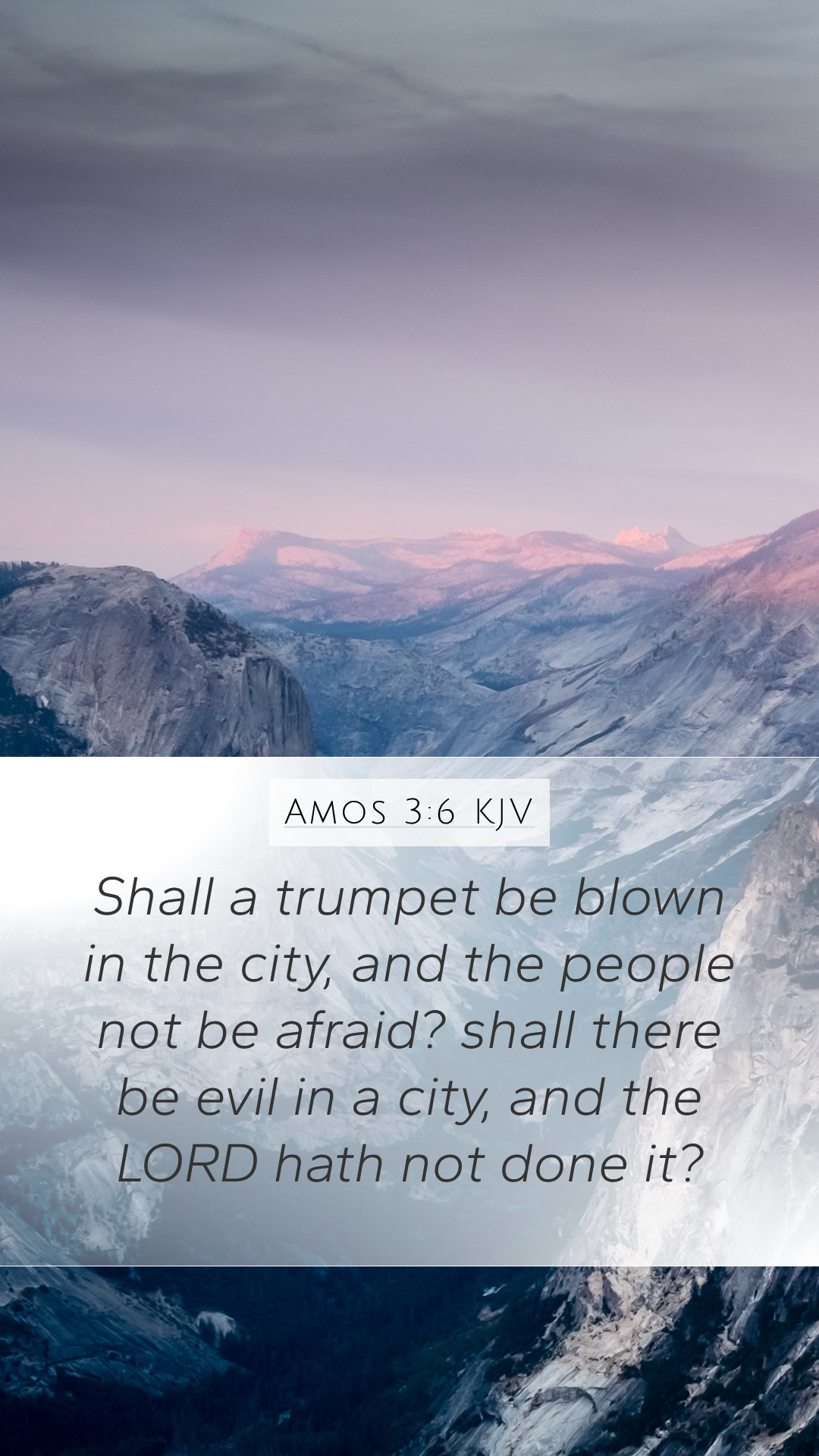Old Testament
Genesis Exodus Leviticus Numbers Deuteronomy Joshua Judges Ruth 1 Samuel 2 Samuel 1 Kings 2 Kings 1 Chronicles 2 Chronicles Ezra Nehemiah Esther Job Psalms Proverbs Ecclesiastes Song of Solomon Isaiah Jeremiah Lamentations Ezekiel Daniel Hosea Joel Amos Obadiah Jonah Micah Nahum Habakkuk Zephaniah Haggai Zechariah MalachiAmos 3:6 Meaning
What is the meaning of Amos 3:6?
Shall a trumpet be blown in the city, and the people not be afraid? shall there be evil in a city, and the LORD hath not done it?
Amos 3:6 Bible Verse Meaning
Understanding Amos 3:6
The verse Amos 3:6 states: "Shall a trumpet be blown in the city, and the people not be afraid? Shall there be evil in a city, and the Lord hath not done it?"
This passage raises profound questions regarding God's sovereignty and the human response to His warnings. In seeking to understand this verse, we draw on insights from respected public domain commentaries, providing a rich tapestry of interpretation, meaning, and practical application.
Contextual Background
The Book of Amos is one of the prophetic books of the Old Testament, set during a time of relative prosperity in Israel; however, this prosperity was accompanied by moral decay and social injustice. Amos was called to deliver God’s message to the northern kingdom of Israel, emphasizing the need for repentance and the consequences of ignoring God's commands.
Verse Breakdown
- The Trumpet: The trumpet is a call to attention, signifying the beginning of a warning or a call to arms. Its sound alerts people to danger.
- Fear of the Lord: When calamities arise, people should naturally be led to fear or respect the authority of God, recognizing His power over events in cities.
- God’s Sovereignty: The implication that if destruction occurs, it has divine approval or permission, emphasizing God's control over all that happens.
Commentary Insights
Matthew Henry
Matthew Henry emphasizes the rhetorical nature of the questions posed in this verse. The trumpet signifies a warning, and the implied answer is that the people should indeed respond with fear. He interprets the “evil” as calamity that the Lord allows or ordains, reinforcing God's ultimate authority in human affairs. Henry stresses that just as the trumpet secures an immediate reaction, so should the recognition of God's will evoke reverence and a call to repentance among the people.
Albert Barnes
Albert Barnes highlights the urgency of recognizing the signs of divine judgment. He interprets "evil" in the context of disasters that God either directly causes or permits to teach lessons to His people. This commentary underscores the notion that God's providence is at work in the affairs of men, suggesting that calamity should prompt earnest introspection regarding spiritual integrity and divine obedience.
Adam Clarke
Adam Clarke provides a theological exposition of the phrase, urging readers to see the prophetic nature of the warning. He notes that the purpose of the questions is to stir the audience to reflect on their spiritual state and God's active role in their circumstances. Clarke elucidates that the passage serves both as a reminder of God’s omnipotence and as a call for the inhabitants of the city to heed divine warnings through the prophet Amos.
Practical Applications
The implications of Amos 3:6 can be profound for individuals and communities today. As we approach this text for Bible study insights, consider the following applications:
- Awareness and Alertness: Just as a trumpet calls attention, believers are reminded to be vigilant in their spiritual lives, observing the signs of the times.
- Response to Warnings: The necessity of understanding Scripture should prompt acknowledgment of impending judgment or correction from God.
- God’s Call to Repentance: This verse beckons individuals and communities to respond to God’s call by turning away from evil and towards righteousness.
Cross References
Amos 3:6 relates to other biblical passages, offering a wider context and deeper understanding:
- Isaiah 45:7: "I form the light and create darkness, I make peace and create evil; I the Lord do all these things." This emphasizes God's sovereignty over good and evil.
- Jeremiah 25:29: "For, lo, I begin to bring evil on the city which is called by my name, and should ye be utterly unpunished?" This reflects God's judgment upon His people.
- Lamentations 3:38: "Out of the mouth of the most High proceedeth not evil and good?" This introduces the idea of God’s sovereign purpose in calamity.
Conclusion
As we delve into this Bible verse commentary on Amos 3:6, we encounter vital truths about divine authority, the nature of prophetic warnings, and the expected human response. Through bible verse interpretations such as those from Matthew Henry, Albert Barnes, and Adam Clarke, we are equipped to better navigate our understanding of Scripture, apply its lessons to daily life, and potentially prepare ourselves for broader bible study groups.
Engaging with the message of Amos calls us to evaluate our hearts and communities in light of God's will, ensuring we do not ignore the spiritual alarms sounding within our lives. This verse serves as a compelling reminder of God’s providential governance in human affairs and the necessity for sincere responsiveness to His voice today.


